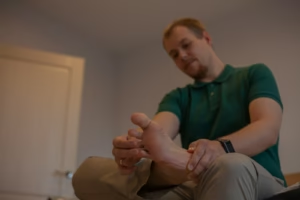Getting Ready When Knee Surgery Is Tomorrow
Over 1.9 million knee surgeries take place every single year in the United States. And we could all guess that for thousands of patients, that night before surgery brings with it a strange mix of anxiety and a whole lot of relief – If you’ve got a knee surgery scheduled for tomorrow theres a pretty good chance your feeling a combination of emotions right now
The hours leading up to surgery are more important than you might think. All that proper getting ready doesnt just calm your nerves as it happens, it actually sets you up for a smoother recovery. As physiotherapists weve guided heaps of patients through this really important moment. This checklist is supposed to help you feel a whole lot more confident, a lot more informed and physically as prepared as you can be for what comes next.
Understanding What Happens Before Surgery
When you’ve got a knee surgery scheduled for tomorrow, getting a handle on the timeline can be pretty reassuring. Most hospitals will want you there a bit early to get checked in & get everything ready to go.
Your surgical team is going to go over your medical history, do some final tests, and field any questions you’ve got. And on top of that, the anesthesiologist will sit down with you to go over your pain management options. The atmosphere might feel a bit sterile, but the truth is that every single person on the team is working their tail off to get you through this surgery and on the road to recovery.
The pre-op period usually lasts anywhere from an hour to 2 hours. While you’re waiting, nurses will put in an IV line and get you all prepped up for anesthesia. So, if you can get all your paperwork squared away beforehand, that’s one less thing to stress about. And let’s be real, this quiet bit of time right before surgery is when mental prep can really start to kick in.
Your Pre-Op Checklist for Tomorrow Morning
Physical Preparation
Get your body ready. Here’s what to do tonight and tomorrow morning:
- Stop eating and drinking at the time your hospital specified (usually midnight). This prevents complications during anesthesia. Your surgical team will confirm the exact fasting window.
- Shower or bathe tonight using regular soap. Don’t use lotions, perfumes or deodorants in the morning of surgery as these can interfere with surgical monitoring equipment.
- Wear comfortable, loose clothing that doesn’t restrict your leg. Button-up shirts are better than pullover tops since you’ll need to remove it for the hospital gown.
- Remove all jewelry, piercings and nail polish before you go. Also leave your watch and rings at home so you don’t lose them.
- Trim your toenails and remove any nail polish if you haven’t already. This helps surgical staff monitor your circulation during the procedure.
- Set your alarm early enough so you don’t rush. A calm morning reduces stress hormones that can raise your blood pressure.
Mental and Emotional Preparation
Your mindset affects your recovery. So spending time on emotional readiness is just as important as physical prep.
- Write down your questions and bring them to the hospital. Examples are pain management expectations, post-op activity restrictions and physical therapy timing.
- Practice deep breathing exercises tonight and tomorrow morning. Breathe in for 4 counts, hold for 4 and exhale for 6. This activates your parasympathetic nervous system.
- Avoid injury related social media and surgery videos. Instead focus on positive stories of successful recoveries.
- Share your feelings with a trusted family member or friend. Talking about your feelings normalizes them and reduces anxiety.
Logistics and Documentation
Organization prevents last minute stress. Here’s what to arrange:
- Confirm your arrival time with the hospital. Call them today if you haven’t received final instructions. Write the time clearly on a visible note.
- Arrange your ride home. You can’t drive after anesthesia. Your designated driver should also plan to stay during recovery.
- Gather your insurance cards, ID and medications in one bag. Keep a list of all current medications and allergies easily accessible.
- Bring entertainment for the waiting room—a book, audiobook or podcast helps pass pre-op time calmly.
What to Expect During Your Pre-Op Hours
The morning of surgery can feel like an out-of-body experience . But having some idea of whats about to go down makes you feel a little more in control.
First, you’ll be heading down to the main desk to check in with the nurse on duty. They’ll then shepherd you over to the pre-op area where you’ll get to meet some of the team. Someone will come in to take your vital signs – and by vital signs I mean your blood pressure, heart rate, oxygen levels and your temperature. This gives your surgical team a baseline to keep an eye on things.
Next up you’ll probably get an IV stuck in your arm. Its a bit of a weird feeling for a second , but it passes soon enough. The IV line will get all sorts of fluids and meds flowing in , and your anesthesiologist will pop by to talk you through the pain control options and try to answer any of your concerns. So if you’re worried about getting sick to your stomach or have some other specific worry , nows the time to bring it up.
Last but not least , there will be a nurse asking you to change into that dreaded hospital gown & get rid of any remaining personal items like specs & hearing aids. They’ll bag all of that up & put it in a safe spot – which can be a bit disconcerting but honestly its just standard procedure & its all done with your safety in mind.
Expert Insights: Why Pre-Op Preparation Matters
Research in the Journal of Perioperative Medicine reveals that patients who stick to pre-operative guidelines can cut down on their recovery time and reduce the number of complications they experience. The specifics are pretty interesting – getting plenty of water before the operation is crucial for keeping the heart in a stable rhythm, and mentally preparing by calming down beforehand has even been shown to lower post-op pain by as much as 20%.
There was a pretty big study done by the American Physical Therapy Association that discovered that patients who knew what to expect from their post-operative recovery and had a good idea of when they’d be getting back to full strength reported being a lot happier with their care and were a lot more likely to follow through on their physiotherapy sessions. That’s just another reason why going over your recovery plan with your doc before the surgery is a good idea.
These days a growing number of top hospitals are making sure to include pre-op ‘prehab’ programs – gentle strength and mobility work before the operation. Now, while you might be scheduled for a surgery tomorrow, the good news is that future patients benefit from fitting in two to four weeks of pre-op physio before hand when they can – it lays a solid foundation that makes it a lot easier to start making progress after the op and speeds things up too.
After Surgery: The Recovery Timeline You Should Know
Knowing whats coming ahead can be a real game-changer for the mind. Most knee surgeries involve an initial recovery phase that can last anywhere from two to six weeks – that’s a pretty standard range we see in most cases. During this time, the main things you’re trying to achieve are managing that swelling, getting your range of motion back to normal, and making sure that surgical site stays safe.
By the time you hit week 3 or 6 you’ll probably start getting into some more active physio work. This might mean you’re doing some gentle strengthening exercises, some balance work, and getting back on your feet with a plan to return to your normal activities. And full recovery, well that’s a whole process on its own. We’re talking three to six months here, but that really does depend on the specifics of your surgery and other factors that are unique to your situation.
Your physiotherapist will be with you every step of the way through each of these phases – and dont forget how important it is to stick to your home exercise routine. If you can stay consistent with those exercises, it really can make all the difference in how well you recover. So give those exercises the same importance as your surgery, and you’ll be setting yourself up for success. Check out Physio Whispers recovery guide to learn more about what to expect from your post-op physiotherapy protocol.
Staying Positive When Knee Surgery Is Tomorrow
Taking action helps calm anxiety. You’re already doing this by reading this and preparing mentally.
Remember, hundreds of patients wake up from knee surgery every day and start their journey to better mobility. Your surgical team has done this procedure hundreds of times. Your body is capable of amazing things. You’ll see progress in weeks, you’ll remember why you did this in months.
Tonight, get good sleep. Tomorrow morning, trust the process. And in the coming weeks, commit to your rehab with the same determination you’re showing now.
What’s the one thing you’ll be most looking forward to doing when your knee feels strong again?
Start your recovery journey now? Go to Physio Whisper’s homepage for personalized advice and evidence based recovery strategies.
References and Further Reading
- American Physical Therapy Association (APTA) – Pre- and Post-Operative Guidelines
https://www.apta.org/ - Journal of Perioperative Medicine – Pre-operative Preparation and Recovery Outcomes
https://www.perioperativemedicine.org/ - Mayo Clinic – Knee Surgery and Recovery Information
https://www.mayoclinic.org/tests-procedures/knee-surgery/about/pac-20385292 - National Library of Medicine (NIH) – Prehabilitation for Knee Surgery
https://www.ncbi.nlm.nih.gov/ - Cleveland Clinic – Preparing for Knee Surgery
https://health.clevelandclinic.org/














